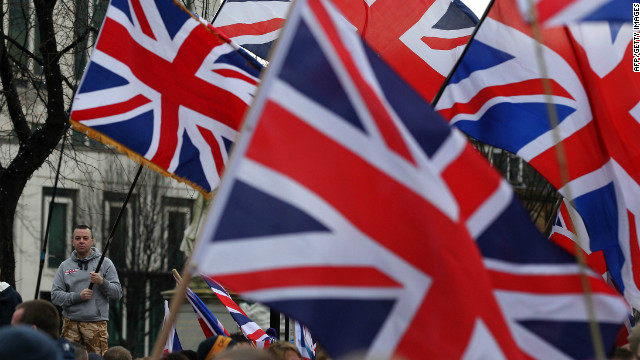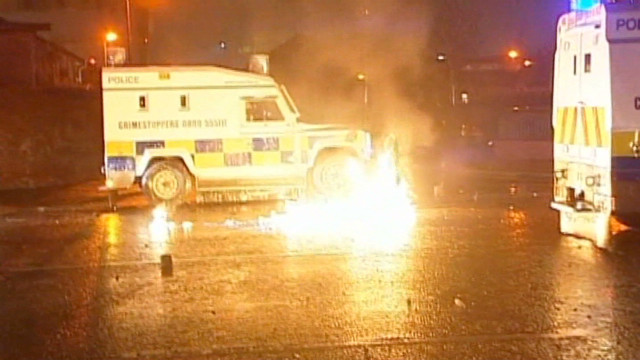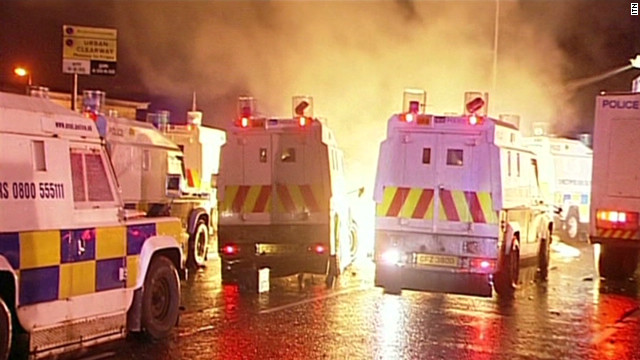Story highlights
- Four police officers are hurt, one is hospitalized
- Two people are arrested
- Protesters angry over a decision to stop flying the Union flag year-round
- Police say 66 officers injured, 100 arrests made since December
Protests broke out Friday throughout Northern Ireland against a decision by Belfast City Council members to stop flying the Union flag year-round.
"Most of the protests were peaceful, although disruption was caused to the road network in Belfast and across the country," police said in a statement.
One of the most serious incidents occurred at O'Neil's Road in Newtownabbey, where about 100 Protestant rioters -- many of them teenagers -- threw concrete blocks, paving slabs, bricks, planks of wood, gasoline bombs and Molotov cocktails at police.
They targeted about 30 armored police vehicles and as many as 100 police officers clad in riot gear. At least one officer appeared injured. His head bowed, the officer was helped away by comrades.
Amid rain and temperatures just above freezing, police brought in two water cannon, deploying one of them to push back the rioters. Police were trying to gain control of a main highway.
In all, four police officers were hurt, with one requiring hospital treatment, and two people were arrested, police said. Thirty-three gasoline bombs were thrown at police during the demonstrations, after which all the roads were reopened.
The eruptions occurred after two nights of calm that followed five consecutive nights of rioting.
Belfast has been at the center of a wave of protests prompted by the City Council's December 3 decision to limit the flying of the flag to 18 days per year.
The disorder has resulted in more than 100 arrests and left 66 officers injured.
The flag was raised Wednesday for the first time since the controversial vote to mark the birthday of Prince William's wife, Catherine. It was lowered at the end of the day.
The leaders of the two main unionist political parties met Thursday to discuss concerns within the unionist community.
Northern Ireland authorities have accused loyalist extremists of exploiting the decision by Belfast officials to end the century-old tradition of flying the Union flag over City Hall 365 days a year.
The British flag has long been a flashpoint between British loyalists and Irish nationalists, who want Northern Ireland to join the Irish republic.
The Belfast City Council vote followed a summer of heightened tensions between Northern Ireland's Catholic and Protestant communities. Riots in September left dozens of police injured.
The majority of Ireland gained independence in 1921 following two years of conflict. But six of the nine counties of the province of Ulster chose to stay in the United Kingdom, eventually becoming Northern Ireland.
In the late 1960s, the conflict between mainly Protestant loyalists, who want Northern Ireland to remain part of the United Kingdom, and largely Roman Catholic nationalists, who want it to be reunited with the rest of Ireland, exploded into a political and sectarian war, known as "the Troubles."
The three decades of ensuing violence between loyalists and the IRA claimed more than 3,000 lives, most of them north of the border. While the Good Friday Agreement of 1998, also known as the Belfast Agreement, effectively ended the conflict, distrust remains between Catholics and Protestants.
Under the terms of the accord, groups on both sides dumped their weapons, and members of Sinn Fein, the political affiliate of the IRA, now work with pro-British politicians in Northern Ireland's power-sharing government.







